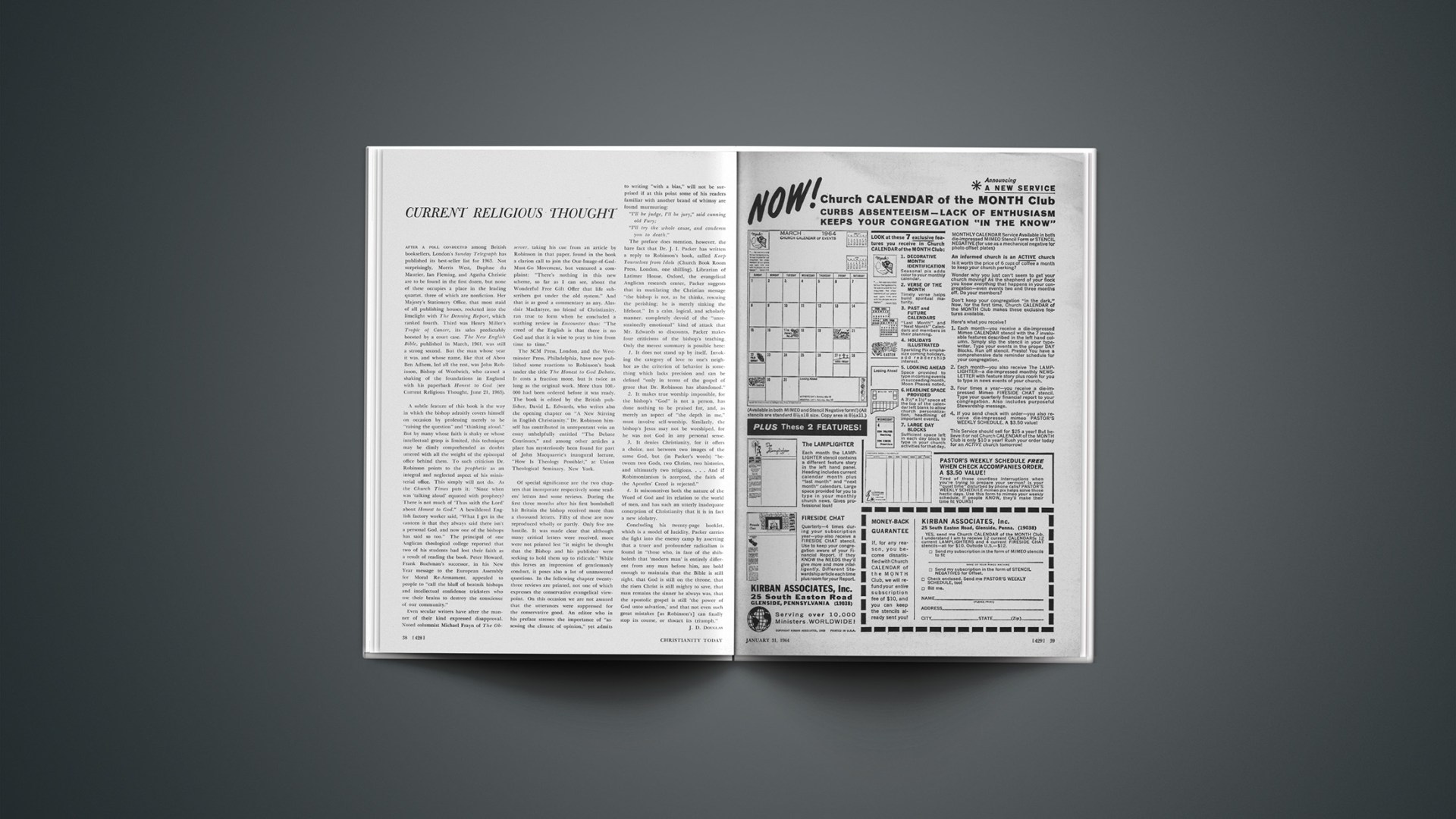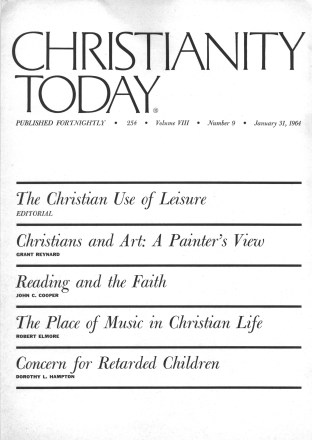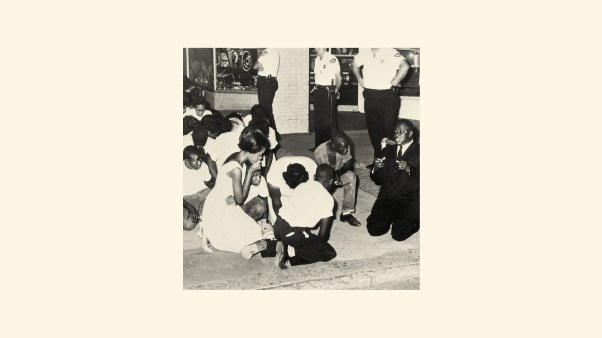After a poll conducted among British booksellers, London’s Sunday Telegraph has published its best-seller list for 1963. Not surprisingly, Morris West, Daphne du Maurier, Ian Fleming, and Agatha Christie are to be found in the first dozen, but none of these occupies a place in the leading quartet, three of which are nonfiction. Her Majesty’s Stationery Office, that most staid of all publishing houses, rocketed into the limelight with The Denning Report, which ranked fourth. Third was Henry Miller’s Tropic of Cancer, its sales predictably boosted by a court case. The New English Bible, published in March, 1961, was still a strong second. But the man whose year it was, and whose name, like that of Abou Ben Adhem, led all the rest, was John Robinson, Bishop of Woolwich, who caused a shaking of the foundations in England with his paperback Honest to God (see Current Religious Thought, June 21, 1963).
A subtle feature of this book is the way in which the bishop adroitly covers himself on occasion by professing merely to be “raising the question” and “thinking aloud.” But by many whose faith is shaky or whose intellectual grasp is limited, this technique may be dimly comprehended as doubts uttered with all the weight of the episcopal office behind them. To such criticism Dr. Robinson points to the prophetic as an integral and neglected aspect of his ministerial office. This simply will not do. As the Church Times puts it: “Since when was ‘talking aloud’ equated with prophecy? There is not much of ‘Thus saith the Lord’ about Honest to God.” A bewildered English factory worker said, “What I get in the canteen is that they always said there isn’t a personal God, and now one of the bishops has said so too.” The principal of one Anglican theological college reported that two of his students had lost their faith as a result of reading the book. Peter Howard, Frank Buchman’s successor, in his New Year message to the European Assembly for Moral Re-Armament, appealed to people to “call the bluff of beatnik bishops and intellectual confidence tricksters who use their brains to destroy the conscience of our community.”
Even secular writers have after the manner of their kind expressed disapproval. Noted columnist Michael Frayn of The Observer, taking his cue from an article by Robinson in that paper, found in the book a clarion call to join the Our-Image-of-God-Must-Go Movement, but ventured a complaint: “There’s nothing in this new scheme, so far as I can see, about the Wonderful Free Gift Offer that life subscribers got under the old system.” And that is as good a commentary as any. Alasdair MacIntyre, no friend of Christianity, ran true to form when he concluded a scathing review in Encounter thus: “The creed of the English is that there is no God and that it is wise to pray to him from time to time.”
The SCM Press, London, and the Westminster Press, Philadelphia, have now published some reactions to Robinson’s book under the title The Honest to God Debate. It costs a fraction more, but is twice as long as the original work. More than 100,000 had been ordered before it was ready. The book is edited by the British publisher, David L. Edwards, who writes also the opening chapter on “A New Stirring in English Christianity.” Dr. Robinson himself has contributed in unrepentant vein an essay unhelpfully entitled “The Debate Continues,” and among other articles a place has mysteriously been found for part of John Macquarrie’s inaugural lecture, “How Is Theology Possible?,” at Union Theological Seminary, New York.
Of special significance are the two chapters that incorporate respectively some readers’ letters and some reviews. During the first three months after his first bombshell hit Britain the bishop received more than a thousand letters. Fifty of these are now reproduced wholly or partly. Only five are hostile. It was made clear that although many critical letters were received, more were not printed lest “it might be thought that the Bishop and his publisher were seeking to hold them up to ridicule.” While this leaves an impression of gentlemanly conduct, it poses also a lot of unanswered questions. In the following chapter twenty-three reviews are printed, not one of which expresses the conservative evangelical viewpoint. On this occasion we are not assured that the utterances were suppressed for the conservative good. An editor who in his preface stresses the importance of “assessing the climate of opinion,” yet admits to writing “with a bias,” will not be surprised if at this point some of his readers familiar with another brand of whimsy are found murmuring:
“I’ll be judge, I’ll be jury,” said cunning old Fury;
“I’ll try the whole cause, and condemn you to death.”
The preface does mention, however, the bare fact that Dr. J. I. Packer has written a reply to Robinson’s book, called Keep Yourselves from Idols (Church Book Room Press, London, one shilling). Librarian of Latimer House, Oxford, the evangelical Anglican research center, Packer suggests that in mutilating the Christian message “the bishop is not, as he thinks, rescuing the perishing; he is merely sinking the lifeboat.” In a calm, logical, and scholarly manner, completely devoid of the “unrestrainedly emotional” kind of attack that Mr. Edwards so discounts, Packer makes four criticisms of the bishop’s teaching. Only the merest summary is possible here:
1. It does not stand up by itself. Invoking the category of love to one’s neighbor as the criterion of behavior is something which lacks precision and can be defined “only in terms of the gospel of grace that Dr. Robinson has abandoned.”
2. It makes true worship impossible, for the bishop’s “God” is not a person, has done nothing to be praised for, and, as merely an aspect of “the depth in me,” must involve self-worship. Similarly, the bishop’s Jesus may not be worshiped, for he was not God in any personal sense.
3. It denies Christianity, for it offers a choice, not between two images of the same God, but (in Packer’s words) “between two Gods, two Christs, two histories, and ultimately two religions.… And if Robinsonianism is accepted, the faith of the Apostles’ Creed is rejected.”
4. It misconceives both the nature of the Word of God and its relation to the world of men, and has such an utterly inadequate conception of Christianity that it is in fact a new idolatry.
Concluding his twenty-page booklet, which is a model of lucidity, Packer carries the fight into the enemy camp by asserting that a truer and profounder radicalism is found in “those who, in face of the shibboleth that ‘modern man’ is entirely different from any man before him, are bold enough to maintain that the Bible is still right, that God is still on the throne, that the risen Christ is still mighty to save, that man remains the sinner he always was, that the apostolic gospel is still ‘the power of God unto salvation,’ and that not even such great mistakes [as Robinson’s] can finally stop its course, or thwart its triumph.”










